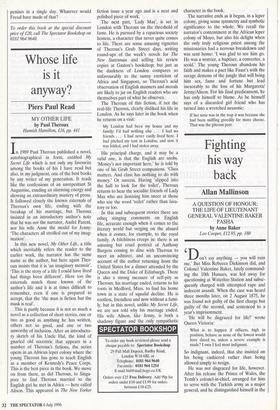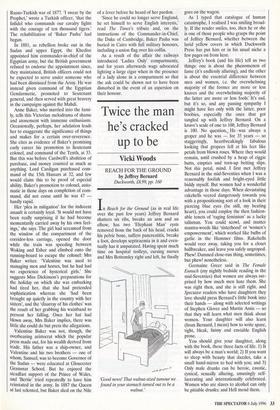Fighting his way back
Allan Mallinson
A QUESTION OF HONOUR: THE LIFE OF LIEUTENANT GENERAL VALENTINE BAKER PASHA by Anne Baker Leo Cooper, f12.95, pp. 180 `13$ on't say anything — you will ruin me.' But Miss Rebecca Dickinson did, and Colonel Valentine Baker, lately command- ing the 10th Hussars, was led away for questioning at Waterloo Station and subse- quently charged with attempted rape and indecent assault. When the case was heard three months later, on 2 August 1875, he was found not guilty of the first charge but guilty of the second, and sentenced to a year's imprisonment.
'He will be disgraced for life!' wrote Queen Victoria: What is to happen if officers, high in position, behave as none of the lowest would have dared to, unless a severe example is made? I own I feel most indignant.
So indignant, indeed, that she insisted on his being cashiered rather than being allowed simply to resign.
He was not disgraced for life, however. After his release the Prince of Wales, the Tenth's colonel-in-chief, arranged for him to serve with the Turkish army as a major general, and he distinguished himself in the Russo-Turkish war of 1877. 'I swear by the Prophet,' wrote a Turkish officer, that the Infidel who commands our cavalry fights with the courage of ten thousand tigers.' The rehabilitation of Taker Pasha' had begun.
In 1881, as rebellion broke out in the Sudan and upper Egypt, the Khedive appointed him commander-in-chief of the Egyptian army, but the British government refused to endorse the appointment since, they maintained, British officers could not be expected to serve under someone who had been dismissed from the Army. He was instead given command of the Egyptian Gendarmerie, promoted to lieutenant general, and then served with great bravery in the campaigns against the Mandi.
Anne Baker, who married into the fami- ly, tells this Victorian melodrama of shame and atonement with immense enthusiasm. Occasionally, perhaps, her adulation leads her to exaggerate the significance of things and makes for a certain over-reverence. She cites as evidence of Baker's promising early career his promotion to lieutenant colonel, and command of the Tenth, at 33. But this was before Cardwell's abolition of purchase, and money counted as much as anything. Lord Cardigan purchased com- mand of the 15th Hussars at 32, and few would claim this to be proof of especial ability. Baker's promotion to colonel, auto- matic in those days on completion of com- mand, did not come until he was 47 hardly rapid.
Her 'plea in mitigation' for the indecent assault is certainly loyal. 'It would not have been really surprising if he had become momentarily carried away by his own feel- ings,' she says. The girl had screamed from the window of the compartment of the corridor-less carriage, opened the door while the train was speeding between Woking and Esher and climbed onto the running-board to escape the colonel: Mrs Baker writes: 'Valentine was used to managing men and horses, but he had had no experience of hysterical girls.' She suggests Miss Dickinson's preparations for the holiday on which she was embarking had tired her, that she had pretended sophistication whereas she 'had been brought up quietly in the country with her sisters', and the 'disarray of his clothes' was the result of her grabbing his waistband to prevent her falling. Once her hat had blown away, Mrs Baker implies, there was little she could do but press the allegations. Valentine Baker was not, though, the overbearing aristocrat which the popular press made out, for his wealth derived from trade. His father was a ship-owner, and Valentine and his two brothers — one of whom, Samuel, was to become Governor of the Sudan — were educated at Gloucester Grammar School. But he enjoyed the steadfast support of the Prince of Wales, and 'Bertie' tried repeatedly to have him reinstated in the army. In 1887 the Queen at last relented, but Baker died on the Nile of a fever before he heard of her pardon. 'Since he could no longer serve England, he set himself to serve English interests,' read The Times's tribute and, on the instructions of the Commander-in-Chief, the Duke of Cambridge, Baker Pasha was buried in Cairo with full military honours, including a union flag over his coffin.
As a result of the affair the railways introduced 'Ladies Only' compartments, and for years afterwards wags advocated lighting a large cigar when in the presence of a lady alone in a compartment so that the ash could be shown not to have been disturbed in the event of an aspersion on their honour.



























































 Previous page
Previous page